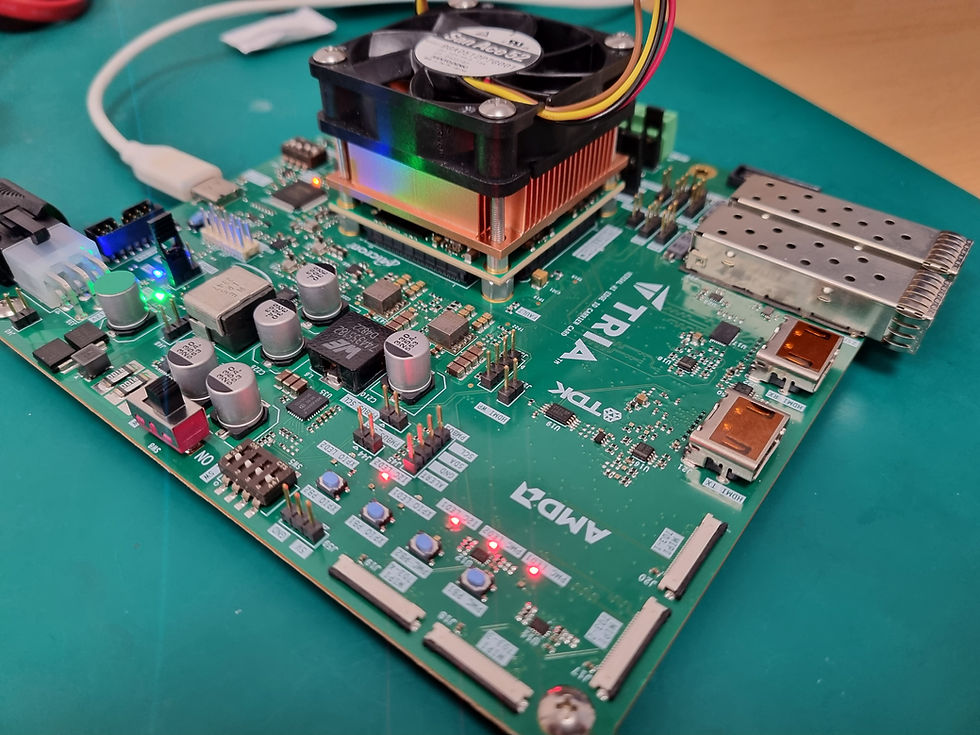MicroZed Chronicles: FPGA Horizons
- Oct 8, 2025
- 4 min read
Back in February, I announced the first dedicated FPGA conference, to be held in London on October 7th.
Once we had settled on a name, FPGA Horizons, and selected a venue, the Pullman Hotel in St Pancras, London, everything started to take shape. The location, right next to two major train stations, the Eurostar and the Elizabeth line, made it easy for most people to attend.
Over the months leading up to the conference, we organised the agenda, SWAG, and all the many things needed to run a successful event, including working with the audio-visual teams necessary to capture all of the presentations.
That said, right up until the actual day, I was convinced it would just be me, an expensive hotel, and a lot of sandwiches to eat, as no one would turn up.

I could not have been more wrong. On the day, over 80% of those with tickets attended, and it was a fun-filled, action-packed day of FPGA talks, networking, and community building for the UK FPGA ecosystem.
The event was kicked off by Kirk Saban and Michael Hutchison from AMD, who talked about 40 Years of FPGA Innovation. They took us on a trip down memory lane, looking at where we came from and where we are going. Their talk tied in nicely with the AMD demo area, which was showcasing everything from the latest Spartan UltraScale+ in the Cost-Optimised Portfolio to the latest Versal RF devices.


We had excellent talks from a range of speakers and vendors. Some of the highlights for me were:
Exostiv Labs – “You Cannot Fix What You Cannot See.”
A look at the importance of visibility in debugging FPGAs and how the Exostiv probe can help. We have covered this probe before, and it remains an impressive tool.

Tomas Chester – “FPGA Design from the PCB Perspective.”
This talk examined whether to use a SoM or a chip-down design when developing FPGA-based solutions. We often focus on what goes into the FPGA, so this was a timely reminder that a holistic view is essential to ensure the best overall design.
Control Paths Engineering – “Real-Time Hardware Simulation with FPGA.”
A fascinating look at how FPGAs can be used to simulate power electronics circuits. I found this a novel and interesting use case.
Analog Devices – “Powering Your FPGA.”
Without a proper power solution, even the best logic design will not function correctly. This talk was an excellent examination of how to ensure robust power delivery for FPGAs. It was particularly timely. On the Monday morning before the conference, I had to drive to Brighton to help a client (new to FPGA) investigate an issue with their boards not configuring correctly, which turned out to be a current limit or power supply problem.
Francesco Gonnella – “HDL on Git (HoG).”
This talk explored how we can work effectively with Vivado and Git. Source control is crucial for every project, and this session offered brilliant insights into how to do this easily and effectively.
All of the talks were genuinely excellent, and I want to thank the speakers for taking the time to prepare and share their knowledge and experience.
If you missed the event, do not worry. All of the talks were recorded and will be made available soon, along with the slides. We just need a little time to edit the videos and upload them to the website.
We also launched the FPGA Horizons Journal, which will run quarterly and be available both digitally and in print at future conferences. Inspired by the old Xcell Journal, this open-access publication will share FPGA knowledge, tips, and techniques.
The first issue examines several applications, including how to build 100G Ethernet on Versal, how UVVM can assist with FPGA design verification, and articles on the importance of signal integrity and PCB layout strategies.

It was a great day for the UK FPGA community, and the next UK event will be held on October 6th, 2026. But first, we have our inaugural US event in Boston in 2026, where we will bring the FPGA Horizons magic across the Atlantic.
UK FPGA Conference
FPGA Horizons US East - April 28th, 29th 2026 - THE FPGA Conference, find out more here.
Workshops and Webinars:
If you enjoyed the blog why not take a look at the free webinars, workshops and training courses we have created over the years. Highlights include:
Upcoming Webinars Timing, RTL Creation, FPGA Math and Mixed Signal
Professional PYNQ Learn how to use PYNQ in your developments
Introduction to Vivado learn how to use AMD Vivado
Ultra96, MiniZed & ZU1 three day course looking at HW, SW and PetaLinux
Arty Z7-20 Class looking at HW, SW and PetaLinux
Mastering MicroBlaze learn how to create MicroBlaze solutions
HLS Hero Workshop learn how to create High Level Synthesis based solutions
Perfecting Petalinux learn how to create and work with PetaLinux OS
Boards
Get an Adiuvo development board:
Adiuvo Embedded System Development board - Embedded System Development Board
Adiuvo Embedded System Tile - Low Risk way to add a FPGA to your design.
SpaceWire CODEC - SpaceWire CODEC, digital download, AXIS Interfaces
SpaceWire RMAP Initiator - SpaceWire RMAP Initiator, digital download, AXIS & AXI4 Interfaces
SpaceWire RMAP Target - SpaceWire Target, digital download, AXI4 and AXIS Interfaces
Embedded System Book
Do you want to know more about designing embedded systems from scratch? Check out our book on creating embedded systems. This book will walk you through all the stages of requirements, architecture, component selection, schematics, layout, and FPGA / software design. We designed and manufactured the board at the heart of the book! The schematics and layout are available in Altium here. Learn more about the board (see previous blogs on Bring up, DDR validation, USB, Sensors) and view the schematics here.
Sponsored by AMD




